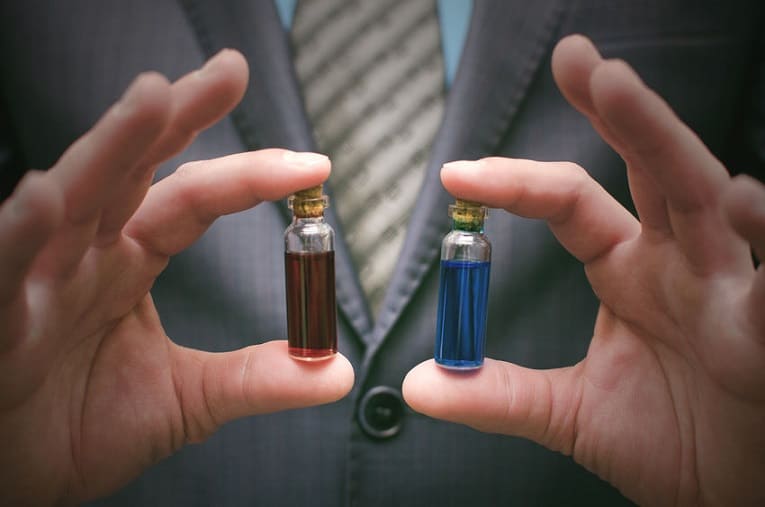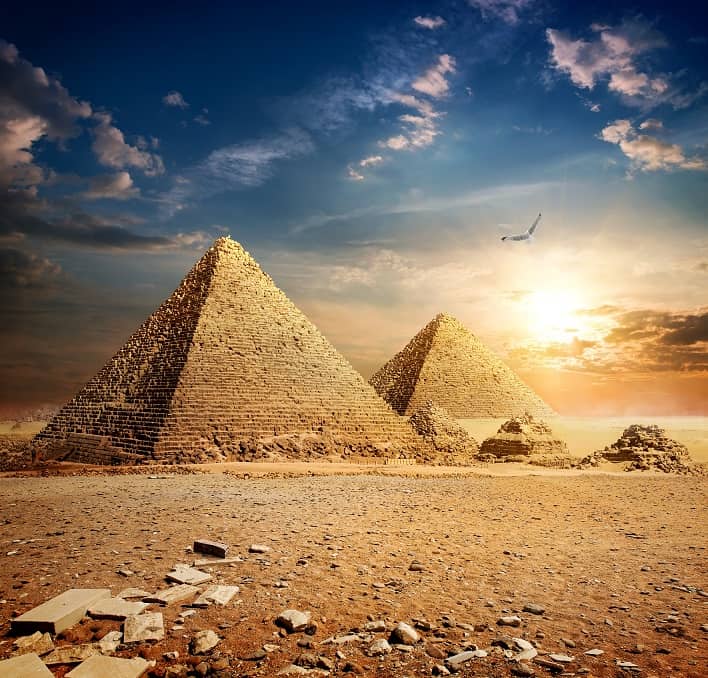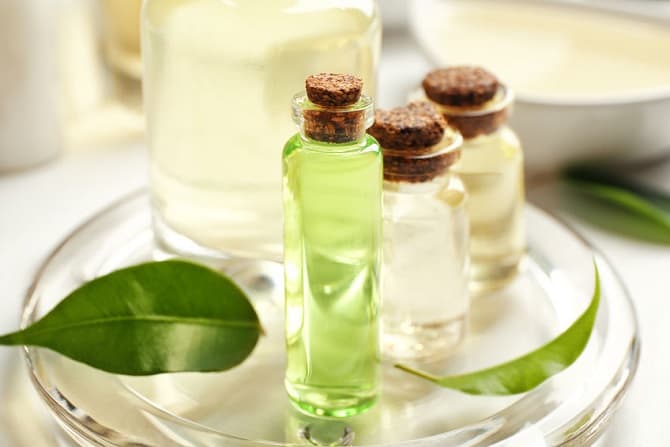 When you hear the words “essential oil”, what image instantly springs to mind? Is it a lilac coloured vial of liquid which can refresh and energise your mind with a single sniff?
When you hear the words “essential oil”, what image instantly springs to mind? Is it a lilac coloured vial of liquid which can refresh and energise your mind with a single sniff?
Is it a useful topical treatment which you have to carefully mix in with some grapeseed oil to possibly reduce acne? Or is it a money obsessed businessman with legions of salespeople at his command, knocking on innocent people’s doors for hours until the poor old lady finally gives in and buys some?
There’s no doubt that nowadays, essential oils are massively controversial. It’s almost impossible to know what to believe, both on the internet and the real world. Proponents claim that essential oils can connect you with ancient energy, wipe away depression and anxiety, and even make you a baseball superstar.
Despite being nothing more than condensed plant matter, essential oils have become their own universe, a quasi-religious movement. However, science focused “skeptic” blogs often go the opposite extreme. They argue that essential oils are medically useless and serve no purpose other than flavouring your bath.
The truth is that the answer is right in the middle, as you’ll know if you’re a regular reader here. Tea tree oil, lavender oil, and their friends have excellent acne studies to their name, but the crazy claims are starting to scare normal people away from them.
Are essential oils a panacea for all illnesses?
If you believe the internet, then there is nothing that a vial of essential oil cannot achieve. Terms like “anti-inflammatory” “rejuvenating”, and “harmonising” are thrown around like confetti.
Some of these claims seem to be made up on the spot, but others are repeated across websites. For example, rosemary extract is commonly called relaxing and energising. Thyme oil is called fortifying and emotionally uplifting, while peppermint oil supposedly reduces fatigue when rubbed into the feet. Random claims abound such as jasmine oil reducing post-natal depression, lavender oil for insomnia, and marjoram oil switching off sexual desire. Article after article raves about their storied history, guarded by Ancient Egyptians and Indian elders alike.
The key to getting rich in this industry seems to be vagueness. More than any other remedy, essentials oils are surrounded by emotional and spiritual terminology such as “calming”, “energising”, “wards off negative energy”. In terms of concrete information, it’s a desert. We’ve talked about the same phenomenon with fruits, websites endlessly recycling the same unsubstantiated health benefits in a game of Chinese whispers, but essential oils takes this to a whole new level. Almost nothing they say can be pinned down.
Deception is everywhere; adverts commonly reference studies that don’t exist, by phantom medical centres which never respond to emails. It’s like the Wild West.
However, there’s also the masses who feel failed by conventional medicine, after cycling through endless antibiotics and pharmaceutical drugs. The vast world of essential oils seems like a golden opportunity. Thus, they get totally ensnared and become true believers, flocking to niche corners of Instagram and Facebook.
For mysterious reasons which even Stephen Hawking probably couldn’t understand, the hub of this craziness is Pinterest. There are endless graphics on Pinterest with charts of the human body and a different essential oil pointing to each limb. For example, to wash away anxiety, one image recommends 5 drops of bergamot, 2 drops of orange, 2 drops of lavender, and 3 drops of frankincense, with the right half of a woman’s face displayed artistically.
If you google “tea tree oil and acne study”, you’ll probably find some decent information. But if you simply search for “tea tree oil” or maybe “lavender oil”, you’ll be sucked into a vortex of confusion.
The rising tide of mysticism
 The craziest part of the movement though, has got to be the religious element. It’s also the element that annoys the most people into hating essentials oils permanently.
The craziest part of the movement though, has got to be the religious element. It’s also the element that annoys the most people into hating essentials oils permanently.
Who knows why, but as of 2020, essential oils have become near inseparable from New Age mythology, and the deeper you venture into the internet, the wackier things get.
The Chakras is a classic one. The 7 Chakras are whirling balls of spiritual energy located around the human body, which essential oils can supposedly rebalance and recharge.
For example, the Sacral chakra (the second) is orange coloured and is located near the stomach. It controls your emotional intelligence, sexual prowess, passion, and you can feed it by inhaling neroli oil, which will unlock your self love and heal emotional traumas like an abusive childhood.
Meanwhile, the sixth chakra, the third eye chakra (which is indigo coloured), is located in the forehead. By balancing this chakra with sandalwood oil, you can enhance your intuition, memory, remembrance of dreams and ability to visualise.
According to facebook comments, essentials oils harmonise your energy flow, return you to your “centre”, and normalise your vibrational frequencies. Quality control is a factor too. Supposedly, therapeutic grade oil is “imbued with god’s intelligence” while lesser bottles have “no living energy” and “act like a robot”. You can even find articles debating whether essential oils are allowed in the Christian faith.
Again, an essential oil is the distilled compounds of a plant’s leaves (perilla), petals (chamomile) or bark (tea tree). What exactly does that have to do with life-giving energy fields? Perhaps it’s the Christian element of the three wise men carrying Frankincense.
Maybe it’s the historical references. Ancient Egyptian pharaohs were buried with jars of essential oils, and the linen they were wrapped with after their internal organs had been removed was treated with camphor oil. When discovered in 1922, Tutankamun’s tomb supposedly had 50 empty bottles of essential oils, which grave robbers had plundered while ignoring the pots of gold. All this adds a certain mystique to them.
Don’t take this is a sneering, overly rigid scientific dismissal, because experimentation is a great thing, but the New Age culture of essential oils is getting out of hand.
A shadowy business is behind the craze
While browsing essential oils, you also may have noticed Instagram promoters or models. Interspersed with “normal” pictures of their car or walking a dog in the park, there will be posts extolling the healing properties of lavender oil. Generally, the style will come off as bright, friendly and optimistic, but also a little bland and corporate.
These people are representatives of a very different branch of the essential oil universe – multi-level marketing (MLM).
Part of the massive popularity of essential oils today can be attributed to two companies called doTerra and Young Living. MLM has similarities to pyramid schemes, but is actually legal. It keeps the pyramid structures of the higher ranking members delegating sales to affiliates lower down, in return for a share of the profits. These workers delegate again, who delegate themselves, until a massive army is formed.
It’s these salesmen who hammer on people’s doors and fill your spam folder with emails that don’t even get your first name correct. Nowadays, they’re all over social media too.
Founded in 2008, doTerra is now an empire, one of the best known multi-level marketing schemes operating in the US today.
Luckily for the head office, MLM removes some of their legal responsibility for advertising. Their minions can make endlessly wacky claims like “starve cancer cells overnight” and “become the happiest/calmest man in your neighbourhood”, boosting sales with no comeback. In 2014, the FDA did show up at doTerra’s headquarters when an affiliate recommended their oils for the ebola virus, but how are they supposed to monitor millions of street level sellers?
Supposedly, 1 in 13 Americans has taken part in a multi level marketing scheme. DoTerra affiliates are now running essential oil “classes” up and down the country, where invitees regularly part with 50 dollars. On their website, doTerra even has tactics for successfully inviting people, like being direct and “connecting authentically and sincerely”.
Many sellers appear to be normal people, who’ll strike up a friendly conversation, before subtly working the topic towards their now healed health woes. Then they’ll hand you a document listing pharmaceutical drugs in your cupboard which can be instantly switched with lavender or jasmine oil.
On the web, it’s possible that individual sellers are recognising their own niche, and expounding on the New age religious themes without believing them. The machine of hype has gone sentient, generating wave after wave of mad claims, growing exponentially.
Shady salesmen are hiding everywhere. You never know if your coworker, your next door neighbour or even Rufus the dog is in on the essential oil bonanza. It gets to the point where you’re admiring your favourite portrait and notice that the eyes are blinking and spying on you. OK, that’s an exaggeration, but if there’s one reason behind the particular craziness of essential oil advertising, it’s MLM.
Unlike insane slimming pills (such as Cal-Ban 3000), which are still around but peaked in the late 80s to early 90s, essential oil madness hasn’t declined at all. In fact, it’s stronger than ever; doTerra claimed in 2012 to have millions of distributors.
For example, from 2007 to 2017, Young Living’s revenue rose from $150 million to $1.5 billion, giving rise to the laughably bad pun that they’re “turning scents into dollars”. The total essential oil industry was worth $7 billion in 2018.
It’s allegedly a scam anyway. The 1% at the top can become millionaires overnight, but the sellers low down the hierarchy lose thousands. You immediately enter the red by spending hundreds of dollars on a starter kit. Half of sellers quit within 1 year and 90% quit within 5 years.
The other side of the coin – the skeptic movement
 So that’s the state of play with the essential oil industry these days. It’s a sorry state of affairs, but does that mean all essential oils are evil? Absolutely not.
So that’s the state of play with the essential oil industry these days. It’s a sorry state of affairs, but does that mean all essential oils are evil? Absolutely not.
Turmeric, for example, has its fair share of Hindu mysticism orbiting it, but its anti-inflammatory properties are second to none. Resveratrol (in red wine) supposedly extends your lifespan so long that you’ll end up living in a grim Transylvanian castle, but scientists do believe that it can extend your telomeres.
There are numerous skeptic blogs on the internet dedicated to shredding alternative health industries, commonly run by people who were duped and wasted years on quack-tastic remedies. Many of their articles are great, but they often go too far in sticking to mainstream opinion. Skeptics argue that essentials oils are only good for flavouring your bathroom and creating homemade perfume, and that it’s all a huge scam which you should forget about.
Think about it logically though. Essential oils are nothing more than hyper condensed versions of a plant’s natural compounds, whether it be cinnamon bark, perilla leaves, or rose petals from a misty Bulgarian valley. In isolation, many of these compounds have fantastic studies to their name.
Some pharmaceutical remedies, which have a rock solid cast iron reputation, were originally compounds extracted from plants like this, such as salicin taken from white willow bark (which became salicylic acid). Therefore, why wouldn’t they work just because they’re now an “essential oil”? It’s only because the very name is associated with fraudsters and multi level marketing.
Dismissing essential oils totally is just a reaction against the insanity, swinging too far in the other direction. The religious aspect particularly turns people off.
Some examples
There isn’t a single essential oil which has reached miraculous status yet. There isn’t a single one that matches a zinc supplement for acne, but scientists have made loads of great discoveries. In fact, despite the hardcore scepticism, scientists in the lab seem oblivious; there are still new studies being pumped out weekly.
Tea tree oil – the best studied remedy against acne and the root causes behind it. Tea tree oil is rich in terpinen-4-ol and alpha terpineol, which lower inflammation and destroy p.acnes with ease.
Lemongrass oil – this grassy oil supposedly brings you good luck in love affairs, but far more importantly, it’s excellent at reducing neutrophils, immune system agents which unleash free radicals against the skin. Its main compounds are citral, borneol and estragole, so one of them is probably responsible.
Rose oil – commonly diluted to form rose water, rich in 2-phenylethanol. In various studies, rose oil has decreased neutrophils, the pro-inflammatory chemical TNF-a, and overall inflammation by 80% plus. It wipes out bacteria such as Klebsiella pneumoniae, Salmonella enteritidis, and Staphylococcus aureus, so the prospects against p.acnes are good.
Lavender oil – consistently decreases neutrophils, though less than rose water and lemongrass oil. Its really promising power is increasing your skin’s collagen, the youthfulness protein, via a mysterious player called transforming growth factor-beta, which also affects wound healing. Its active compounds are linalool and linalyl acetate.
Some, such as juniper berry oil, do seem to be useless. There will inevitably be variation. Essential oils aren’t a monolithic block, it all depends on the plant (and therefore the nutrition) they are distilled from.
Conclusion
Some claim that sniffing jasmine oil nightly will reconnect you with your transcendent vibration energy. Others argue that the only fragrance of jasmine oil is the stench of false advertising and fraud.
The truth? The answer lies in the middle. Don’t be put off by the hardcore arguments or preaching on either side.
That’s the biggest problem about the whole thing; when people stumble across this preaching about chakra and revitalising your inner energy, they might become skeptical about the whole subject. It won’t matter whether tea tree oil is prove to destroy p.acnes bacteria; the word essential oil will turn them off instantly.
In fact, it could go a step further and turn people away from natural remedies altogether. Because of they accidentally burnt themselves once by leaving their lavender oil in the sun (its linalool is prone to oxidation), the opportunities of lowering sugar, applying aloe vera, and stuffing their face with pomegranate might be permanently lost to them.
Don’t let this happen to you! None of these shenanigans will alter the actual properties of lavender or eucalyptus oil, which have remained unchanged for millions of years. The real truth is out there.
Essential oils have many promising powers for acne, but somehow, the “movement” has been hjiacked. Oh, and one final note – if you sign up to an essential oil pyramid scheme, you won’t be driving a gold-coated ferrari by the end of tomorrow.
Thanks for reading!

Why do some people say that essential oils are bad because they are far too concentrated and release volatile organic compunds?